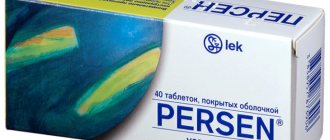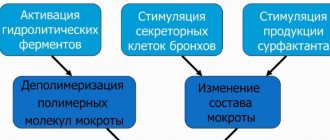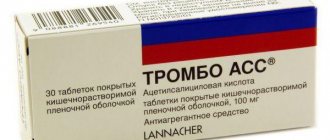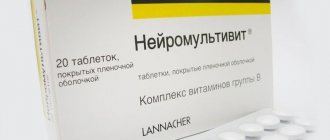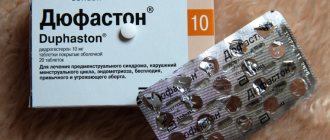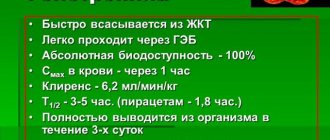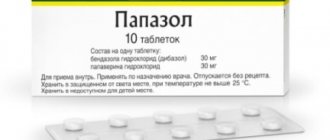pharmachologic effect
According to the instructions, Fosicard belongs to the group of ACE inhibitors.
The drug contains the active ingredient - fosinopril. In the body, it turns into an active metabolite that can inhibit angiotensin-converting enzyme (ACE). As a result, the chain of biochemical reactions in the body is disrupted: angiotensin-I is not converted into angiotensin-II, and its vasoconstrictor, and therefore blood pressure-increasing, effect is not realized. This medicine does not change blood circulation to the kidneys, brain, or muscles.
By eliminating vascular spasm, Fosicard reduces total peripheral vascular resistance, and therefore blood pressure. The drug reduces pre- and afterload on the heart muscle. As a result of treatment, the destruction of bradykinin, a biologically active substance that dilates blood vessels, slows down.
After oral administration, Fosicard is well absorbed; food intake may slow down the rate of absorption . The therapeutic effect begins to appear after 1 hour, it is maximum 2-6 hours after administration and persists throughout the day. Therefore, to achieve a reduction in blood pressure, it is enough to take Fosicard once a day.
The transformation of the drug occurs in the digestive tract and liver, excretion from the body is carried out through the kidneys and bile.
Analogs of Fosicard are drugs based on fosinopril, such as Monopril, Fozinotec.
Similar drugs:
- No-Spa Oral tablets
- Vinoxin-mv (VINCAMINUM) Oral tablets
- Liprazidum 10 Oral tablets
- Magnesium sulfate Powder for oral suspension
- Magnesium sulfate Substance-powder
- Niacin (Niacyne) Substance-powder
- Lisinopril Oral tablets
- Platyphyllin Oral tablets
- Parnavel Oral tablets
- Diroton Oral tablets
** The Drug Directory is intended for informational purposes only. For more complete information, please refer to the manufacturer's instructions. Do not self-medicate; Before you start using Fosicard, you should consult a doctor. EUROLAB is not responsible for the consequences caused by the use of information posted on the portal. Any information on the site does not replace medical advice and cannot serve as a guarantee of the positive effect of the drug.
Are you interested in the drug Fosicard? Do you want to know more detailed information or do you need a doctor's examination? Or do you need an inspection? You can make an appointment with a doctor - the Euro lab is always at your service! The best doctors will examine you, advise you, provide the necessary assistance and make a diagnosis. You can also call a doctor at home . Euro lab clinic is open for you around the clock.
** Attention! The information presented in this medication guide is intended for medical professionals and should not be used as a basis for self-medication. The description of the drug Fosicard is provided for informational purposes and is not intended for prescribing treatment without the participation of a doctor. Patients need to consult a specialist!
If you are interested in any other drugs and medications, their descriptions and instructions for use, information about the composition and form of release, indications for use and side effects, methods of use, prices and reviews of drugs, or you have any other questions and suggestions - write to us, we will definitely try to help you.
Contraindications
You should not take the drug if you are intolerant of its constituent components, in the case of idiopathic or hereditary angioedema in the past, including if it occurred in response to taking other Fosicard analogues from the group of ACE inhibitors .
The medicine can be used with caution in cases of renal and chronic heart failure of degrees III and IV, with diabetes mellitus, systemic connective tissue diseases, certain heart and kidney defects, in the elderly, if you need to follow a salt-restricted diet.
There are no reviews of Fosicard in terms of its safety in children under 18 years of age, as well as pregnant and breastfeeding women.
Fosicard - contraindications, side effects
Contraindications.
- Hypersensitivity to the active or any of the excipients of the drug or other ACE inhibitors.
- Angioedema associated with previous treatment with ACE inhibitors.
- Hereditary/idiopathic angioedema.
- Renal artery stenosis (bilateral or stenosis of the artery of a single kidney). Cardiogenic shock.
- In combination with aliskirenvmisnim drugs in patients with diabetes mellitus or moderate to severe renal failure (GFR <60 ml/min/1.73 m2).
- Pregnant women or women planning pregnancy.
Adverse reactions.
Infections and infestations: upper respiratory tract infections, pharyngitis, rhinitis, viral infection; sinusitis, tracheobronchitis; laryngitis, pneumonia.
From the blood and lymphatic system: decreased hematocrit; transient anemia, eosinophilia, leukopenia, lymphadenopathy, neutropenia, thrombocytopenia, agranulocytosis.
Metabolic and nutritional disorders: loss of appetite, gout, hyperkalemia; appetite disorders, body weight fluctuations.
From the nervous system and mental disorders: dizziness, paresthesia, headache, taste disturbance, mood changes, sleep disturbance; depression, confusion, ischemic stroke, drowsiness, stroke, fainting, tremor, dysphasia, memory impairment, disorientation; imbalance.
From the organ of vision: visual impairment, eye diseases.
From the organs of hearing and labyrinth of the ear: pain in the ears, tinnitus, vertigo.
From the cardiovascular system: tachycardia, arrhythmia, palpitations, angina pectoris, orthostatic effects (including hypotension), arterial hypertension, shock, transient ischemia, myocardial infarction and cerebral stroke, cardiac arrest, conduction disturbances, hot flashes, bleeding, peripheral vascular disease; frequency unknown: hypertensive crisis.
From the respiratory system: cough, shortness of breath, bronchospasm, nosebleeds, pulmonary edema; dysphonia, pleuritic pain.
From the gastrointestinal tract: nausea, vomiting, diarrhea, abdominal pain, dyspepsia, constipation, dry mouth, flatulence, oral lesions, pancreatitis, swelling of the tongue, bloating, dysphagia; intestinal obstruction, pancreatitis, angioedema of the intestine.
From the digestive system: hepatitis, liver failure.
Skin: rashes, angioedema, dermatitis, increased sweating, itching, urticaria; ecchymoses.
From the musculoskeletal system and connective tissue: musculoskeletal pain, myalgia, arthritis, muscle weakness.
From the urinary system: urinary disorders; renal failure, proteinuria, acute renal failure.
From the reproductive system and mammary glands: sexual dysfunction, prostate disorders.
General reactions and conditions: chest pain (non-cardiac origin), fatigue, asthenia, edema, fever, peripheral edema, chest pain; weakness in one limb; pain.
From laboratory parameters: increased alkaline phosphatase, increased bilirubin, increased LDH, increased transaminases; temporary decrease in hemoglobin level, increase in body weight, increase in blood urea level, increase in serum creatinine, hyperkalemia; slight increase in hemoglobin, hyponatremia. abnormal liver tests.
Instructions for use of Phosicard
The tablets are taken orally whole, regardless of food, with water. The therapeutic dose and course of administration are selected individually in each case. A few days before the start of the course, it is recommended to discontinue other antihypertensive drugs. When it is not possible to cancel diuretics, the dose of Fosicard should be no more than 10 mg/day.
For arterial hypertension, start taking Fosicard 10 mg once a day, observing changes in pressure. If the desired blood pressure level is not achieved, you can gradually increase the dose to 40 mg/day (this is the maximum dose). If monotherapy with the drug does not sufficiently reduce blood pressure, treatment can be enhanced by adding diuretics.
In combination treatment regimens for chronic heart failure, start taking Fosicard with 5-10 mg 1 time per day , the dose is increased gradually if necessary. The doctor should monitor each increase in dosage.
For liver and kidney diseases, no dose reduction is required.
When used simultaneously with antacids, the absorption of Fosicard is reduced, which means its therapeutic effect is not fully manifested. Therefore, it is necessary to maintain an interval of 2 hours between taking these medications.
Fosicard
Name:
Fosicard
Release form, composition and pack
The tablets are round, flat-cylindrical, white or almost white, marked on one side with the letters “FL” and the number “5”.
1 tab. fosinopril sodium 5 mg.
Excipients: lactose monohydrate, croscarmellose sodium, pregelatinized corn starch (starch 1500), microcrystalline cellulose, glycerol dibehenate.
The tablets are round, flat-cylindrical, white or almost white, marked on one side with the letters “FL” and the number “10”.
1 tab. fosinopril sodium 10 mg.
Excipients: lactose monohydrate, croscarmellose sodium, pregelatinized corn starch (starch 1500), microcrystalline cellulose, glycerol dibehenate.
The tablets are round, flat-cylindrical, white or almost white, marked on one side with the letters “FL” and the number “20”.
1 tab. fosinopril sodium 20 mg.
Excipients: lactose monohydrate, croscarmellose sodium, pregelatinized corn starch (starch 1500), microcrystalline cellulose, glycerol dibehenate.
Clinical and pharmacological group: ACE inhibitor.
pharmachologic effect
ACE inhibitor. Fosinopril is an ester from which the body produces an active metabolite, fosinoprilate. Fosinoprilat prevents the conversion of angiotensin I to the vasoconstrictor substance angiotensin II, which leads to vasodilation, a decrease in peripheral vascular resistance and a decrease in aldosterone secretion. Due to a decrease in the secretion of aldosterone, a slight increase in the content of potassium ions in the serum occurs with a simultaneous loss of sodium ions and fluid from the body.
The drug has antihypertensive, vasodilating, diuretic and potassium-sparing effects.
The antihypertensive effect is also due to the suppression of the metabolism of bradykinin, which has a pronounced vasodilating effect.
A decrease in blood pressure is not accompanied by changes in blood volume, cerebral and renal blood flow, blood supply to internal organs, skeletal muscles, skin, or reflex activity of the myocardium.
The antihypertensive effect of the product is preserved during long-term treatment; tolerance to the product does not develop. After oral administration, the antihypertensive effect develops within 1 hour, reaches a maximum after 2-6 hours and persists for 24 hours.
Pharmacokinetics
Suction
After oral administration, absorption from the gastrointestinal tract is within 30-40%. The extent of absorption is independent of food intake, but the rate of absorption may be slow. Cmax of fosinoprilat in plasma is achieved after 3 hours and does not depend on the dose taken.
Distribution
Plasma protein binding - 95%. Fosinoprilat has a relatively small Vd. Does not penetrate the BBB.
Metabolism
In the mucous membrane of the gastrointestinal tract and, partially, in the liver, fosinopril is hydrolyzed to fosinoprilat.
Removal
Fosinopril is excreted from the body to the same extent in bile and urine. T1/2 of fosinoprilat is within 11.5 hours.
Indications
- arterial hypertension;
- chronic heart failure (as part of combination therapy).
Dosage regimen
Before starting treatment for arterial hypertension, if possible, previously used antihypertensive treatment should be discontinued several days before starting Fosicard.
The initial dose is 10 mg 1 time. In the future, the dose must be selected depending on the dynamics of the decrease in blood pressure. The average maintenance dose is 10-40 mg 1 time. In the absence of a positive effect from Fosicard monotherapy, additional diuretics may be prescribed.
If treatment with Fosicard is started against the background of diuretic therapy, then its initial dose should be no more than 10 mg with careful medical supervision.
In the treatment of chronic heart failure, the initial dose of Fosicard is 10 mg 1 time. Then the dose of the product is selected in accordance with the dynamics of therapeutic effectiveness, increasing by 10 mg at weekly intervals. The maximum dose is 40 mg. Additional diuretics may be prescribed.
Side effect
From the cardiovascular system: decreased blood pressure, orthostatic hypotension, tachycardia, palpitations, arrhythmias, angina pectoris, myocardial infarction, chest pain.
From the digestive system: nausea, vomiting, constipation, intestinal obstruction, stomatitis, glossitis, dyspepsia, abdominal pain, anorexia, cholestatic jaundice, pancreatitis, hepatitis.
From the respiratory system: dry cough, shortness of breath, pharyngitis, laryngitis, sinusitis, pulmonary infiltrates, bronchospasm, dysphonia.
From the urinary system: development or worsening of symptoms of chronic renal failure, proteinuria, oliguria.
From the central nervous system and peripheral nervous system: stroke, cerebral ischemia, dizziness, headache, weakness, hearing and vision impairment, tinnitus, vestibular disorders; when used in large doses - insomnia, anxiety, depression, confusion, paresthesia.
Allergic reactions: skin rash, itching, angioedema.
From laboratory parameters: hypercreatininemia, increased urea concentration, increased activity of liver transaminases, hyperbilirubinemia, hyperkalemia, hyponatremia, decreased hemoglobin concentration and hematocrit, neutropenia, leukopenia, eosinophilia, increased ESR.
Contraindications
- hereditary or idiopathic angioedema (including a history) after taking other ACE inhibitors;
- pregnancy;
- lactation period (breastfeeding);
- children and adolescents up to 18 years of age;
- high sensitivity to fosinopril and other components of the product.
The product should be used with caution in case of renal failure, hyponatremia (risk of dehydration, arterial hypotension, chronic renal failure), bilateral renal artery stenosis or stenosis of the artery of a single kidney, aortic stenosis, condition after kidney transplantation, desensitization, systemic connective tissue diseases, in incl. SLE, scleroderma (increased risk of developing neutropenia or agranulocytosis), with hemodialysis, cerebrovascular diseases (including cerebrovascular insufficiency), with ischemic heart disease, chronic heart failure of functional class III and IV according to the NYHA classification, diabetes mellitus, suppression of bone marrow hematopoiesis, hyperkalemia, in elderly patients, when following a diet with limited salt, in conditions accompanied by a decrease in blood volume (including diarrhea, vomiting).
Pregnancy and lactation
The use of Fosicard is contraindicated during pregnancy and lactation.
Use for renal impairment
The product should be used with caution in case of renal failure.
special instructions
Patients with severe arterial hypertension or concomitant decompensated chronic heart failure should begin treatment with Fosicard in a hospital setting.
Before and during treatment with the product, monitoring of blood pressure, kidney function, potassium concentration, hemoglobin, creatinine, urea, electrolyte concentrations and liver enzyme activity in the blood is necessary.
While taking Fosicard, the number of leukocytes in the peripheral blood should be periodically monitored, especially in patients with an increased risk of neutropenia (with impaired renal function and systemic connective tissue diseases). Due to the increased risk of developing arterial hypotension, caution must be exercised when prescribing the product to patients on a low-salt or salt-free diet.
Use in pediatrics
The safety and effectiveness of Fosicard in children have not been established.
Impact on the ability to drive vehicles and operate machinery
Caution should be exercised when driving vehicles or performing any other work requiring increased attention due to the possible occurrence of dizziness, especially after taking the initial dose of Fosicard in patients concomitantly taking diuretics.
Overdose
Symptoms: marked decrease in blood pressure, bradycardia, shock, water-electrolyte imbalance, acute renal failure, stupor.
Treatment: stop taking the product, place the patient in a supine position with legs elevated. In mild cases of overdose - gastric lavage, administration of sorbents and sodium sulfate for 30 minutes after administration. When blood pressure decreases - intravenous administration of catecholamines, angiotensin II; for bradycardia - use of a pacemaker. Hemodialysis is ineffective.
Drug interactions
Antihypertensive drugs, diuretics, opioid analgesics, and general anesthesia agents, when used simultaneously with Fosicard, enhance its hypotensive effect.
NSAIDs and estrogenic products, when used simultaneously, reduce the severity of the antihypertensive effect of Fosicard.
When using Fosicard simultaneously with potassium products and potassium-sparing diuretics, the risk of developing hyperkalemia increases.
Fosicard enhances the hypoglycemic effect of sulfonylurea derivatives and insulin.
When using Fosicard simultaneously with allopurinol, cytostatic drugs, immunosuppressants, procainamide, the risk of developing leukopenia increases.
When taking Fosicard simultaneously with lithium salts, it is possible to increase the concentration of lithium in the blood.
Storage conditions and periods
The drug should be stored out of reach of children at a temperature not exceeding 25°C.
Shelf life: 2 years.
Attention! Before using Fosicard, you should consult your doctor. The instructions are provided solely for familiarization with “ Fosicard ”.
How does Phosicard work?
Regular use of this drug leads to suppression of bradykinin metabolism and vasodilation. Thanks to this, experts highlight not only an antihypertensive effect, but also a diuretic, potassium-sparing and vasodilating effect.
A decrease in blood pressure when taking Phosicard is not accompanied by a change in blood flow in the brain, blood supply to the kidneys and other internal organs.
The greatest effect after taking this drug can be expected after 60 minutes; the hypertensive effect persists throughout the day.

